Catherine Brown explores how the wrong journalists escaped prosecution in one case while the wrong one is being subjected to it in the other.
By Catherine Brown
catherinebrown.org
 The U.K. phone hacking scandal started around 2005 and peaked in 2012. The journalistic malpractices and illegal practices on which it focused long pre-date 2005, however, and continue today.
The U.K. phone hacking scandal started around 2005 and peaked in 2012. The journalistic malpractices and illegal practices on which it focused long pre-date 2005, however, and continue today.
It came to light through the testimony of victims and the investigative journalism of publications such as The Guardian that several newspapers owned by Rupert Murdoch’s News International (U.K. subsidiary of News Corp), as well as others including Daily Mirror and Sunday Mirror, were engaged in illegal practices such as hacking individuals’ phone voicemails and bribing the police in order to obtain stories.
Rupert Murdoch’s influence over U.K. politicians was also scrutinized. Victims of phone hacking included members of the royal family, politicians, murdered schoolgirl Milly Dowler, relatives of British soldiers killed in Iraq and Afghanistan and victims of the July 7, 2005, London bombings.
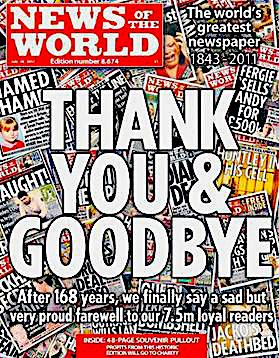
Final edition of News of the World, July 10, 2011. (Wikimedia Commons)
The public outcry at these revelations and resultant investigations resulted in high-profile resignations including Murdoch as director of News Corporation, his son James as its executive chairman and the commissioner of London’s Metropolitan Police Force. There were multiple charges and seven convictions in criminal trials held between 2004 and 2014. News of the World, a News International outlet, closed down after 168 years of existence.
In 2011, Conservative Prime Minister David Cameron established a public inquiry into the culture and ethics of the U.K. press under Lord Justice Leveson.
This inquiry resulted in the 2012 Leveson Report, which made several recommendations concerning regulation of the British media by an independent regulator, which would give alleged press victims access to arbitration without financial risk.
Conservative governments since 2012 have declined to implement Leveson’s recommendations. In 2011, the FBI and the Department of Justice launched probes into News Corporation practices in the U.S., but no decisive action has been taken.
When the Medium is the Message
If you believe the word itself, the media mediates. It isn’t anything in itself. It transmits something else.
In general journalists do not want to be the story. They want to inform, disinform, persuade, distract, entertain, but not be the focus of attention themselves. This applies to WikiLeaks publisher Julian Assange as much as it applies to the journalists who hacked the phone of murdered schoolgirl Millie Dowler.
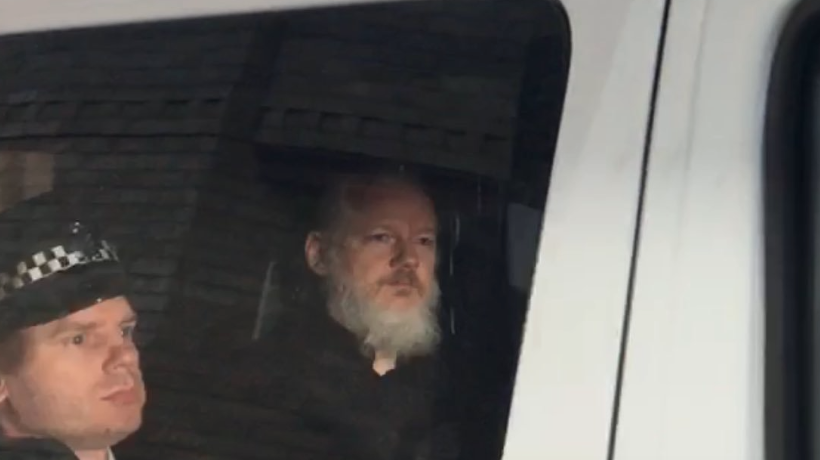
Julian Assange, at right, on way to Belmarsh Prison, April 11, 2019. (Twitter)
But sometimes the medium does become the message, and the journalist becomes the story written by other journalists, as in both those cases.
We have seen the former CEO of News International Rebekah Brookes, and Assange, arrested, put on trial, and subject to huge amounts of journalistic attention, because their journalism, it was alleged, broke the law.
In both cases the question of their methods overshadowed their matter – their matter being for example that Dowler’s parents left messages on Millie’s phone in March 2002 that were hacked, or that U.S. soldiers killed over a dozen Baghdadi civilians in July 2007.
These things were revealed around the same time and involved some of the same people. For example, journalist Nick Davies was leading the investigations of phone hacking at The Guardian whilst he was working with Assange to publish the Afghan war logs.
But there are differences. And in them I think we see clearly one of the ways in which our society has gone wrong.
Though I am going to be concentrating on newspapers, which have increasingly struggled over the past decade in print form, they retain considerable influence in electronic form, setting the agenda for TV news and therefore for politics. Their domination by a few magnates who have influence over politicians parallels the situation in social media, where voices that hold power to account are increasingly squeezed out, albeit in less obvious ways.
So, let’s compare them. I’m going to compare them on seven points, and then I’m done.
First, the motivation and nature of the investigations.
The phone hacking scandal happened as a result of exposure by other journalists from 2005 onwards. The phrase “phone hacking” described only part – arguably the least part – of what was revealed: journalists bribing police for information, evidence- and consequence-free destruction of individuals’ reputations and media magnates’ control of politicians and therefore of politics itself.
The U.K. press had provoked six major investigations in as many decades, of which none had prevented the need for the next one. It was public feeling, especially in response to the revelation in 2011 of the hacking of Dowler’s phone, that induced the Conservative government to set up the Leveson Inquiry.
There were several arrests and convictions.
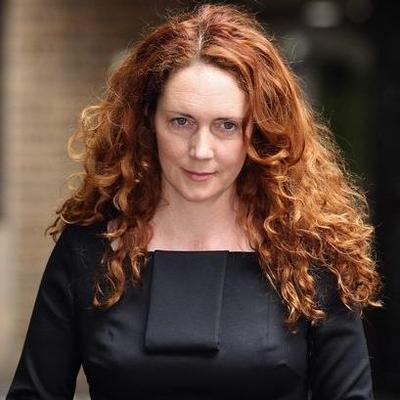
Rebekah Brooks. (Twitter)
News of the World’s Glenn Mulcaire was jailed for six months; Clive Goodman was jailed for four months. Previous News of the World editor, later CEO of News International, Rebekah Brooks, was arrested several times and finally tried on charges relating to the phone hacking, and perverting the course of justice, in 2014 – but was cleared. The newspaper’s editor, Andy Coulson, after resigning from that post, was made Downing Street’s director of communications.
Meanwhile Leveson’s report into press culture was published in 2012, but under the inquiry’s terms, this concluded only the first part of Leveson’s duties. Leveson Part 2 was to involve criminal investigations of journalists and police, building on the findings of Part 1. In March 2018 the Conservative government announced that it was cancelling Leveson Part 2.
In other words, the government prevented a planned investigation of journalists’ illegal activities, and of police collusion with those activities, for which there was a strong prima facie case.
In the case of Assange, as we know well, the government incited the Crown Prosecution Service, and criminal prosecutors in Sweden, to investigate crimes for which the prima facie case was always suspect in ways that have kept Assange in detention for as long as possible. It has involved shocking derogations from legal protocol and of the independence of the judiciary.
The second point of comparison is the motivation behind the media coverage of these stories.
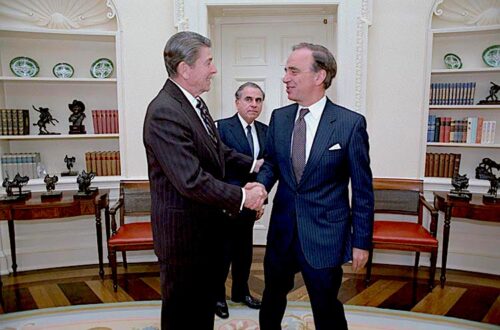
Rupert Murdoch, at right with President Ronald Reagan; Charles Wick in center, 1983. (White House, Wikimedia Commons)
In the case of the tabloid malfeasance, it is clear that many of the journalists uncovering the scandal were sincerely motivated by the public interest.
It should be noted that their newspapers’ proprietors didn’t have the close relationship with the government that, say, Murdoch did, and therefore they had less to lose from revealing this relationship. The story enabled them to assert their difference from the journalists they were denouncing. But inevitably they were accused of betraying their own kind.
In Assange’s case, those same newspapers, especially The Guardian, couldn’t in good faith assert such a distance because they themselves had published materials given to them by WikiLeaks.
But one gets the sense that these papers, especially The Guardian, have since been trying to restore whatever relationship they had with the government, or responding to government pressure by their subsequent participation in Assange’s character assassination. Some of the journalists involved may have also been motivated by feminist, anti-Trump and anti-Russian grounds, which have misled so many about Assange.
The contrast between The Guardian’s relative fearlessness about a government embarrassment involving primarily domestic affairs, and its compliance regarding one involving primarily foreign affairs, the secret services, and the U.S., is indicative of an important new dynamic in government-media power relations.
The third comparison is the attitude of the government to the media scrutiny.
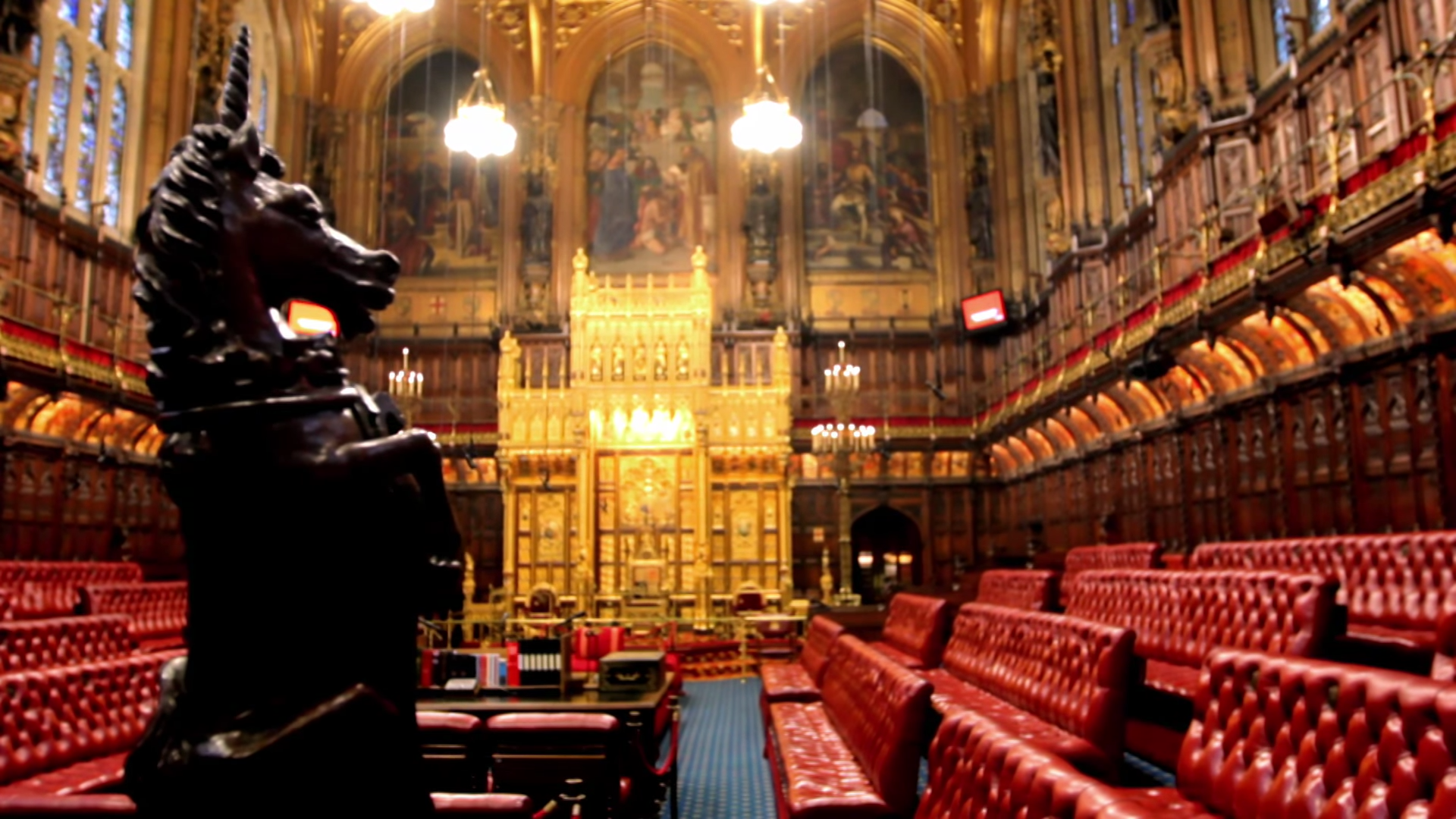
Chamber of the House of Lords. (UK Parliament, Wikimedia Commons)
The government has not enforced the recommendations of Leveson Part 1. And the Independent Press Standards Organisation (IPSO), which replaced the discredited Press Complaints Commission in 2014, has continued its ignoble and ineffective course.
In 2019, a former Conservative member of the House of Lords, Lord Faulks, was appointed IPSO’s chair in complete contravention of the principles of press freedom and of distance between press regulators and government.
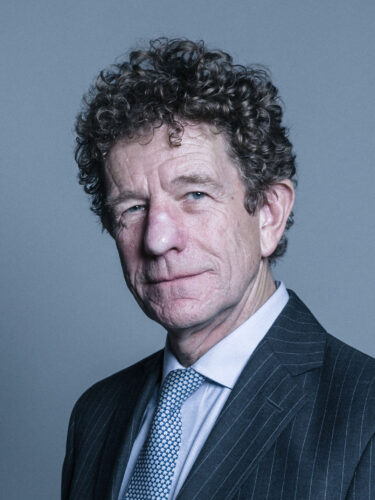
Lord Faulks. (Chris McAndrew, Wikimedia Commons)
Most U.K. newspapers are signed up to IPSO, and the result is that the overwhelming majority of the coverage of Leveson has been hostile, while press malfeasance continues to drop out of the news with newspapers having given up on the cause.
The result is that anyone complaining to IPSO or to the newspapers directly — for example, about Julian Assange’s character assassination that involved clear lies, such as Assange’s alleged meeting with Paul Manafort in the Ecuadorian embassy — has no accessible recourse.
Leveson recommended that newspapers enter a low-cost arbitration scheme, allowing redress for victims of press smears without the cost and risk of libel proceedings. The failure to implement Leveson’s recommendations has left the public without that option. He also recommended that corrections to false stories be published in the same position and prominence as the original story. As it is, corrections continue to be made in small fonts in discrete corners of publications, when at all.
Fourth, the motivation of the charged journalists’ work.
In the cases of News International, the Daily Mirror and the rest, rank-and-file journalists were compelled by fear for their jobs and/or ambition, and the editors and proprietors were motivated by money.
Hacking the phones of 7/7 victims didn’t actually further the editors’ political interests, but the power they had over politicians helped them in weakening the law’s pursuit of them for these violations.
Assange’s motivation was neither money nor any political motivation other than the public interest served by revealing crimes on the part of states and other organizations.
Fifth, the contents of the accused journalists’ revelations.
One result of the phone-hacking scandal was the removal from the internet of material illegally obtained. It would have been difficult to argue that these largely trivial revelations about celebrities were in the public interest.
(Of course, the public interest is distinct from what the public are interested in. People may be interested that actor Hugh Grant briefly visited a hospital in March 2011 when he was feeling faint, as The Sun told us – but it is not in the public interest to know it. Feeling faint is not a crime, and no crimes were revealed by the hacking.)
Please Contribute to Consortium News’
25th Anniversary Fall Fund Drive
Assange, on the other hand, revealed the most serious crimes possible — to the point of even justifying hacking, which Assange is wrongly accused of collaborating in — yet since the failed prosecution of Clive Ponting (the civil servant who leaked a damning truth about the U.K. prosecution of the Falklands War in 1984), the public interest in national security cases is defined however the U.K. government sees fit.
Sixth, the response of the majority of the public to the two scandals.
In the case of the tabloid behavior, there was considerable, widespread public anger for a year or so. Then the majority of the press regained the narrative — that is, it managed to conflate the-freedom-of-the-press-to-break-the-law-without-a-reasonable-justification with freedom of the press per se — and smeared the characters of some of the leaders of Hacked Off, the group which campaigns for press regulation.
The anger has now died down, though its causes remain.
In Assange’s case, he has been largely successfully monstered by the majority of the press.
As a result, the wrong journalist is mistrusted, and the wrong journalists walk free.
In fact, in the case of Assange, who was revealing information of major importance, the way that the narrative of his alleged wrongdoing has dwarfed the narrative of proven, major wrongdoing that he provided, is astonishing.
In both cases similar dynamics seem to have been in play.
My day-job is teaching literature to university students, and I’m well aware that it’s a peculiarity of humans to crave narratives. Most of us are interested in the lives of real or fictional individuals in a way that we are not in systems or abstractions. The thousands of lives illegally destroyed in Iraq and Afghanistan, as Assange helped to reveal, seem to many to be abstractions, whereas Assange’s alleged criminality is a story that can be followed. The countless journalists who help to corrupt our national life, and the media-political complex are, again, abstractions.
Who leaked the spring 2020 Labour report into the party’s handling of anti-Semitism claims, or the U.S.-U.K. trade documents, has the appeal of a whodunnit; a history of Labour internal sabotage intended to undermine former leader Jeremy Corbyn, or a future of increasing animal cruelty and falling food standards, doesn’t.
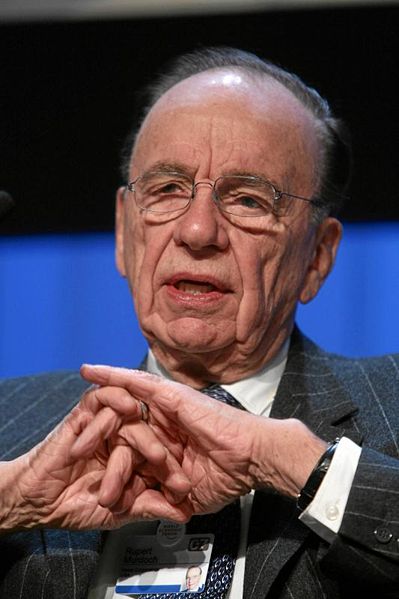
Rupert Murdoch. (World Economic Forum)
There is also in both cases a sense of passivity and fatality — that of course Murdoch has influence over British politicians; that of course American soldiers commit war crimes; and of course modern technology gives the NSA and GCHQ scrutiny over our lives beyond the wildest dreams of the Stasi. But people like Assange, Chelsea Manning and Edward Snowden may or may not get away with revealing these crimes, and therefore there is a story to follow.
Thus, our interest is successfully deflected from the largest scale onto the individual scale – but in a way which threatens, rather than protects, those individuals as well as obscuring their message. For those following the stories without a grasp of the real abstract principles involved, a hero can be cast as a villain, whose suffering – as is true of all fictional villains – doesn’t matter.
It doesn’t always happen. The MPs’ expenses scandal of 2009 dwarfed interest in how the documents that proved the scandal got into journalists’ hands. Recent animal activists’ exposés of conditions in British pig farms such as Hogwoods have attracted more public interest than the illegal modes used to obtain the footage (and it is worth mentioning here that WikiLeaks has revealed much information about new so-called ag-gag laws in the U.S., which criminalize revelations of illegal commercial animal cruelty, and against which there is a considerable backlash). The same was true when The Guardian in January 2020 published leaked police documents classifying animal and environmentalist groups, plus Stop the War, along with far-right extremists and jihadists with a counter-terrorist response.
Seventh, the response of a minority of the public to the two scandals.
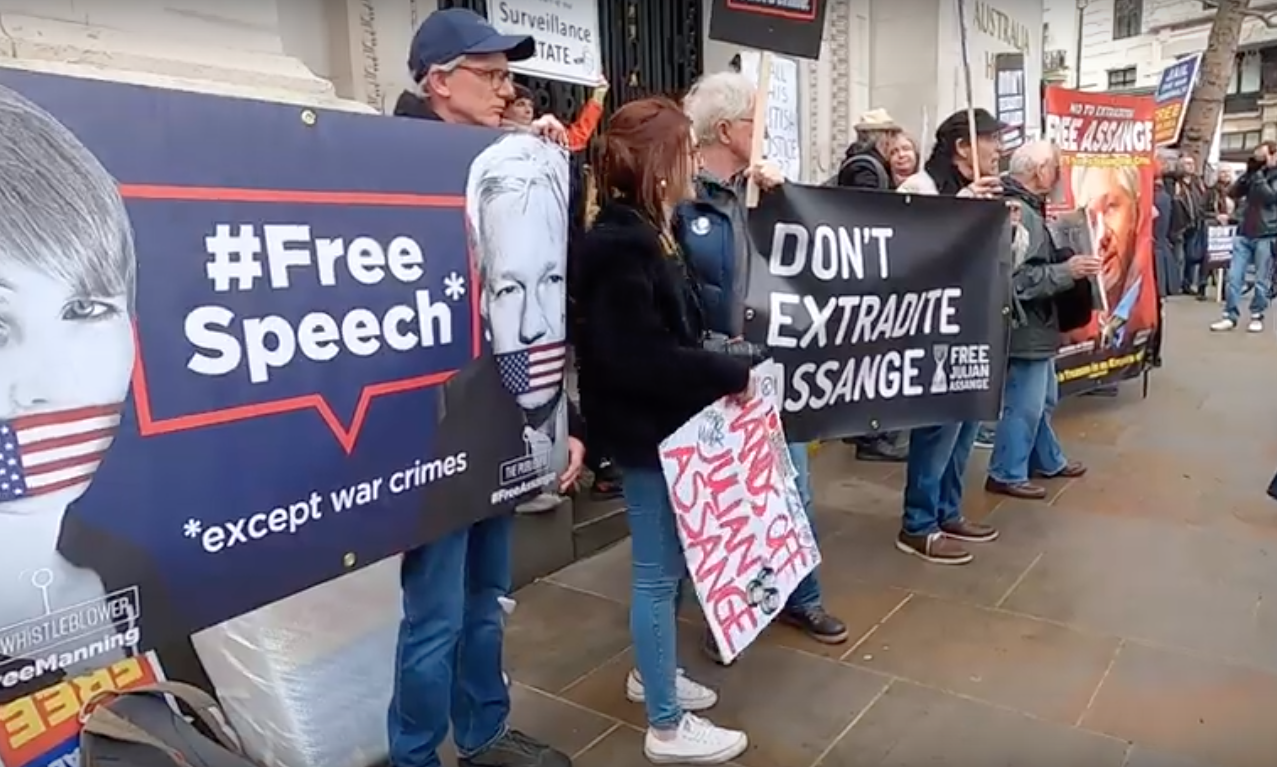
Pro-Assange protesters in London during extradition hearings in February 2020. (CN Live)
There has always been a small, passionate subset of the public who have remained focused on the crimes revealed in the phone hacking scandal or by Assange.
In the first case they campaign for the prosecution of journalists who commit actual crimes in anything but the public interest.
In the second, they campaign against the prosecution of a journalist who, so far from having committed a crime, has acted overwhelmingly in the public interest.
These positions support each other.
Proper press regulation would distance the media from the state, protect journalism that was genuinely in the public interest, and permit redress for character assassination, which is why the UK’s National Union of Journalists supports both causes.
Unfortunately, not all of the leadership of Hacked Off sees the connection between their cause and Assange’s, nor do all supporters of Assange approve of statutory press regulation.
But that some kind of robust and transparent regulation of the news media is needed should be clear. Without it we have, by default, improper regulation: the unofficial squeezing out of dissident voices, concerted character assassination and other lies voiced without the possibility of redress, and (on social media) shadow-banning on the basis of unstated political desiderata.
To conclude, some journalists are obeisant to governments.
Some, like Murdoch, dominate governments.
Some, like Assange, hold them to account.
Governments naturally react accordingly, and sometimes lean on the judiciary to enforce their response.
But the revelation of this fact by other journalists can cause them embarrassment, and may hinder them from carrying on.
Catherine Brown is senior lecturer and head of faculty of English at Northeastern University’s New College of the Humanities.
This is an edited version of a speech she delivered at St. Pancras Church, London on Sept. 8 at the “Imperialism on Trial: Free Julian Assange’ event.”
The views expressed are solely those of the author and may or may not reflect those of Consortium News.
Please Contribute to Consortium News’
25th Anniversary Fall Fund Drive
Donate securely with
Click on ‘Return to PayPal’ here.
Or securely by credit card or check by clicking the red button:



Show Comments